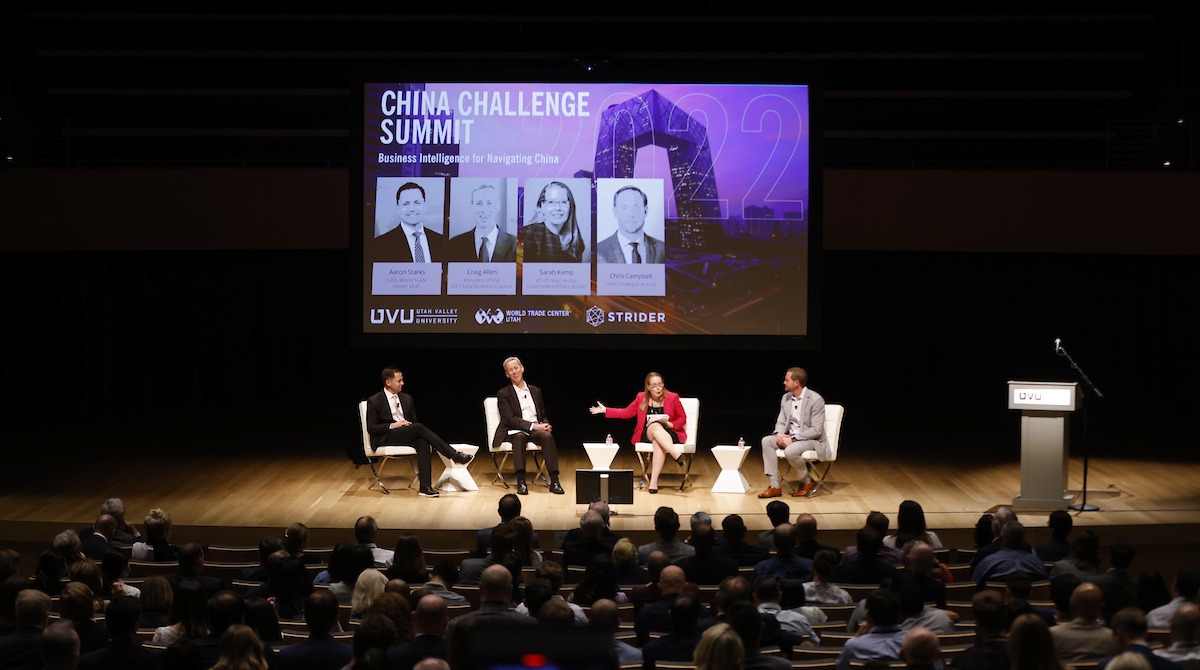The summit was created by UVU and World Trade Center Utah and featured experts on mutual political, economic, and security interests between China and the United States.

Hundreds gathered at Utah Valley University (UVU) on Thursday, June 9, at the China Challenge Summit during an unprecedented conference designed to address U.S.-China relations.
The summit was created by UVU and World Trade Center Utah and featured experts on mutual political, economic, and security interests between China and the United States. Experts included former Deputy National Security Advisor Matt Pottinger, U.S.-China Business Council President Craig Allen, UVU President Astrid S. Tuminez, and former U.S. Ambassador to China Jon Huntsman.
“We’re not here to fall back on conventional wisdom and soundbites,” Huntsman said. “We're on the front end of what will be the defining decade of the U.S.-China relationship.”
Professionals from various industries spoke during the morning’s plenary session in a sit-down panel discussion in the Scott and Karen Smith Theatre at UVU. Topics ranged from China’s global influence, U.S. diplomacy and foreign policy, U.S.-Chinese trade policies, and best practices for businesses in China.
“I am very grateful and proud that this conference is taking place at UVU,” President Tuminez said. “I believe that this university is part of a brain trust, not only in the state of Utah but of the country as a whole. And we should do some of our hardest thinking and our hardest conversations in a university.”
In his opening remarks, President and CEO of World Trade Center Utah Miles Hansen expressed that the responsibilities of U.S.-Chinese relations don’t fall squarely on the shoulders of diplomats.
“There are tectonic shifts happening in the U.S.-China relationship,” Hansen said. “We wanted to pull everybody together with the best and the brightest from across the country to talk about these challenges, then take it a few steps deeper and ask the most important question: What do we do?” he said. “What we do is also something that we need to figure out as a country.”
In a recorded conversation between former U.S. Ambassador to China Jon Huntsman and current U.S. Ambassador to China Nicholas Burns, the two diplomats discussed how the relationship between the U.S. and China has changed in the past decade.
To Ambassador Burns, the U.S. and China relationship is strained due to issues such as trade wars, disputes in Taiwan and Hong Kong, polarized political ideologies, and human rights violations. Burns said that the nation should be cautious of China’s growing ambition.
“The Chinese government is much more assertive than it was 10, 15, or 20 years ago against the interests of the United States,” Burns said. “We've got to invest in our own country to compete effectively with China.”
In another panel discussion, business experts with ties to China addressed what the country’s surging economy means for those wishing to navigate commerce in the increasingly complex Chinese marketplace.
U.S.-China Business Council President Craig Allen said that American businesses working in China are doing well considering the political headwinds. He further stated that Utah businesses should consider starting work in China. “Utah is an export powerhouse,” Allen said. “The water’s warm; please jump in.”
President Tuminez said the summit was created, in part, to educate Utah’s business leaders about Chinese trade relations.
“Utah is the strongest economy in the United States,” she said. “Our businesses need to understand what’s going on in China. Whether we like it or not, China is our third-largest trading partner after Canada and Mexico. They own over a trillion dollars of American debt. They have a billion people. They are very powerful in the world.”
The event was sold out, with seven hundred people from UVU and the community at large in attendance.